The massacre of 16 people in the Panjwai District of Kandahar province in Afghanistan on March 11 re-ignited widespread calls, inside and outside Afghanistan, for Western forces to leave.
US army spin has not quelled anger or questions over how the massacre took place, who was involved and how to deal with those responsible.
Witnesses say US army staff sergeant Robert Bales, along with 15-20 others, went on a rampage — sexually assaulting, then massacring and burning mainly women and children from the remote farming villages of Najeeban and Alkozai.
-
-
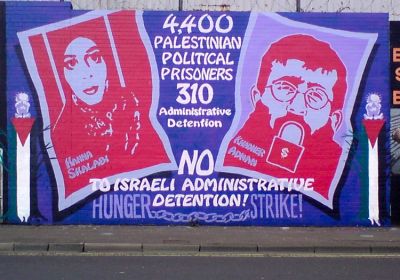 Hana Shalabi, a 30-year-old Palestinian woman, was close to death after being on hunger strike since February 16, Physicians for Human Rights-Israel and Palestinian prisoner rights group Adameer said in a March 20 statement.
Hana Shalabi, a 30-year-old Palestinian woman, was close to death after being on hunger strike since February 16, Physicians for Human Rights-Israel and Palestinian prisoner rights group Adameer said in a March 20 statement. -
Six Zimbabwean socialist activists were convicted on March 19 for “conspiracy to commit public violence”. Their “crime” was to watch a video in February last year about the anti-dictatorship uprising in Egypt. But the activists won a partial victory two days later when they were given suspended jail sentences of two years. The six were also ordered to each do 420 hours of community service and pay a fine of US$500 (A$478). The six had faced up to 10 years’ in jail, a sentence demanded by the state prosecutor, Edmore Nyazamba.
-
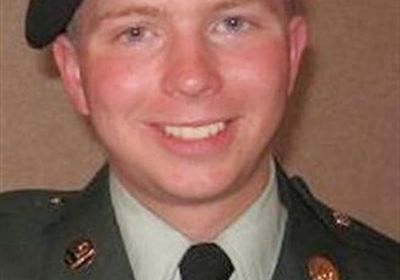 Preliminary court-martial proceedings against United States soldier Bradley Manning have shown the US government's strong desire to make an example of him. Manning is the military analyst accused of leaking hundreds of thousands of secret US diplomatic cables and US military reports from the Iraq and Afghanistan wars to whistleblowing website WikiLeaks. Rather than seek to investigate the serious war crimes revealed in the leaks — and prosecute those responsible — the US government has persecuted Manning.
Preliminary court-martial proceedings against United States soldier Bradley Manning have shown the US government's strong desire to make an example of him. Manning is the military analyst accused of leaking hundreds of thousands of secret US diplomatic cables and US military reports from the Iraq and Afghanistan wars to whistleblowing website WikiLeaks. Rather than seek to investigate the serious war crimes revealed in the leaks — and prosecute those responsible — the US government has persecuted Manning. -
 Last week I had a dream that my house in the western part of Tokyo was shaking violently around me. Then I woke up and discovered it wasn’t a dream at all. It was a 5.3 magnitude earthquake with its epicentre in nearby Saitama. It was the second earthquake I had felt in less than a week following the March 11 anniversary of Japan's earthquake and tsunami disaster. It was a frightening and potent reminder of exactly why it is so important to rid Japan of nuclear power plants.
Last week I had a dream that my house in the western part of Tokyo was shaking violently around me. Then I woke up and discovered it wasn’t a dream at all. It was a 5.3 magnitude earthquake with its epicentre in nearby Saitama. It was the second earthquake I had felt in less than a week following the March 11 anniversary of Japan's earthquake and tsunami disaster. It was a frightening and potent reminder of exactly why it is so important to rid Japan of nuclear power plants. -
At last, the bill has been passed to enable Britain's health service, the envy of the world, to become more like the United States system, universally derided as a chaotic disaster. Now they can introduce bills to make our ferry service more like the one in Italy, and our record on child abuse more like that of the Vatican. It takes inventive thinking to hear that in the US, drug companies spend twice as much on advertising as they do on research, and say, "That's MARVELLOUS, why can't WE do that"?
-
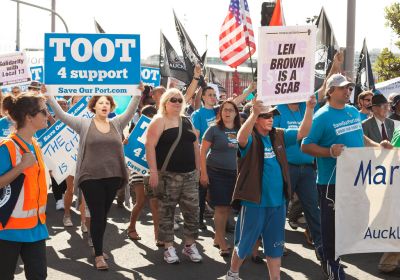 A number of high-profile industrial struggles are unfolding in New Zealand. About 1500 aged care workers, members of the Service and Food Workers Union, are taking part in rolling strikes against a 1% pay rise offer. About 750 meat workers have been locked out by their employer AFFCO and about 1250 workers are involved in rolling stoppages in solidarity. Striking Auckland waterside workers are also into their fourth week on the picket line. What links all these struggles are pay and conditions ― especially the fight against casualisation.
A number of high-profile industrial struggles are unfolding in New Zealand. About 1500 aged care workers, members of the Service and Food Workers Union, are taking part in rolling strikes against a 1% pay rise offer. About 750 meat workers have been locked out by their employer AFFCO and about 1250 workers are involved in rolling stoppages in solidarity. Striking Auckland waterside workers are also into their fourth week on the picket line. What links all these struggles are pay and conditions ― especially the fight against casualisation. -
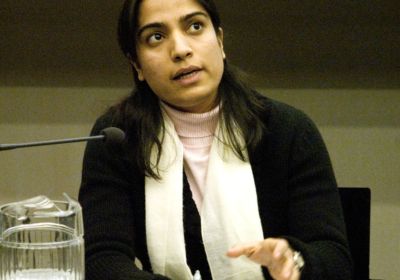 Malalai Joya, a former MP and one of Afghanistan’s best-known democratic leaders, recently survived the sixth attempt on her life. Taliban gunmen attacked her office at 3 am on March 10, wounding two of her guards. In an exclusive interview, she told Green Left Weekly’s Pip Hinman that “such terrorist acts will never stop my fight for freedom, democracy and justice”.
Malalai Joya, a former MP and one of Afghanistan’s best-known democratic leaders, recently survived the sixth attempt on her life. Taliban gunmen attacked her office at 3 am on March 10, wounding two of her guards. In an exclusive interview, she told Green Left Weekly’s Pip Hinman that “such terrorist acts will never stop my fight for freedom, democracy and justice”. -
Sixty thousand people marched on Madison, Wisconsin on March 10 to mark the one-year anniversary of the passage of Governor Scott Walker's drastic dismantling of collective bargaining rights for public employees. Last year, Walker's attacks on labour rights sparked huge protests. Hundreds of thousands occupied the Wisconsin capital building. Their actions prefigured Occupy Wall Street and inspired countless others to take a stand against economic inequality, political injustice, and the tyranny of the 1% enforced through politicians and banksters.
-
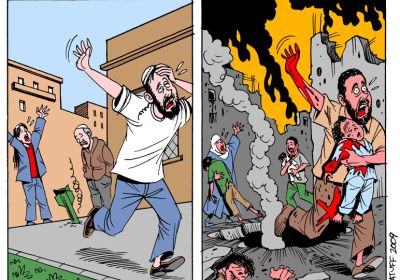 The latest wave of murderous Israeli air strikes on Gaza, which began on March 9, appeared aimed at raising pressure for war on Iran and undermining Palestinian group Hamas. Al Jazeera said on March 13 that 25 Palestinians had been killed by Israeli forces in the first four days of air strikes. It said 18 of the dead had been identified as resistance fighters. A Palestinian Center for Human Rights (PCHR) report on March 12 said 73 Palestinians, mostly civilians, were wounded in the strikes.
The latest wave of murderous Israeli air strikes on Gaza, which began on March 9, appeared aimed at raising pressure for war on Iran and undermining Palestinian group Hamas. Al Jazeera said on March 13 that 25 Palestinians had been killed by Israeli forces in the first four days of air strikes. It said 18 of the dead had been identified as resistance fighters. A Palestinian Center for Human Rights (PCHR) report on March 12 said 73 Palestinians, mostly civilians, were wounded in the strikes. -
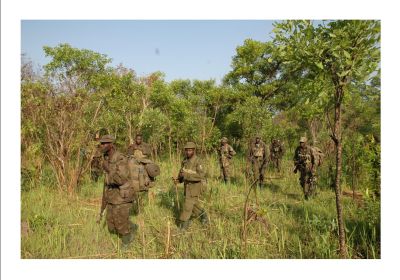
Ugandan newspapers carried front-page reports in recent weeks from the highly respected Social Science Research Council of New York, accusing the Ugandan army of atrocities against civilians in Central African Republic while on a mission to fight Joseph Kony and the Lord's Resistance Army (LRA).
-
 Tens of thousands filled the square as the echoes of the speaker at the podium boomed through huge speakers. Some came in anger, others in grief, but all agreed: it was time for a change. Many carried banners, others carried drums; some had taken their children out of school to attend. No, this wasn't Tahrir Square; it was Tokyo, Japan, on a chilly Monday last September. Ever since the devastating earthquake and tsunami that crippled the Fukushima Daiichi nuclear power station, Japanese civil society has become less, well, polite.
Tens of thousands filled the square as the echoes of the speaker at the podium boomed through huge speakers. Some came in anger, others in grief, but all agreed: it was time for a change. Many carried banners, others carried drums; some had taken their children out of school to attend. No, this wasn't Tahrir Square; it was Tokyo, Japan, on a chilly Monday last September. Ever since the devastating earthquake and tsunami that crippled the Fukushima Daiichi nuclear power station, Japanese civil society has become less, well, polite.